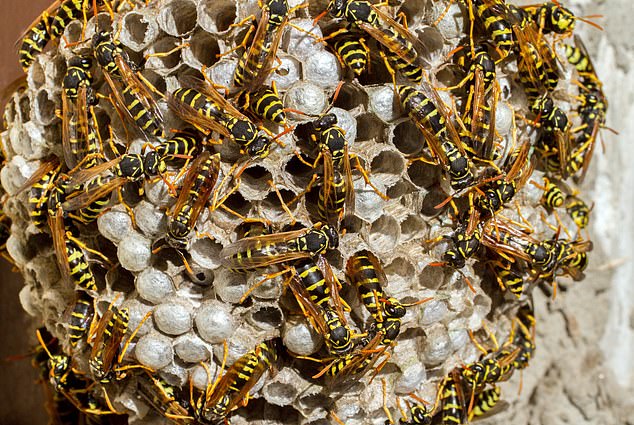We’re trying to sell our house, but next door has a major wasp infestation at the front of their property, which is always visible during viewings.
We have young children and have previously mentioned the wasps to the neighbours in question, but they just don’ tseem bothered about getting the infestation sorted.
How can we get our neighbours to get rid of the wasps? What are their options for getting this problem resolved and can we compel them to sort it out?

Wasp woes: A This is Money reader has a neighbour with a wasp nest issue
Jane Denton, of This is Money, replies: Britain is facing a surge in wasps this summer, with some experts claiming there is a ‘population explosion.’
The spring sunshine lured wasps out of hibernation early, giving them more time to grow. The head start means this year’s nests are already surpassing last year’s in size, with months still to go.
Social wasps live in colonies and in Britain are usually yellow and reddish brown or black. Their colonies can consist of hundreds or thousands of female workers and their much larger mother, the egg-laying queen.
Wasps have a bad reputation, but, according to the Royal Horticultural Society, are beneficial in gardens as they feed their grubs on caterpillars, greenfly and other insects and help reduce plant damage.
However, wasps can become a nuisance to people during the late summer when, as the weather becomes a little cooler, they become more likely to sting. A wasp, unlike a bee, can sting many times.
Social wasps in distress emit a pheromone that sends nearby colony members into a defensive, stinging frenzy.
Although a wasp sting is not normally serious, it can be painful, and in certain cases cause a severe reaction.
While not a long-term solution, keep your property’s doors and windows closed to prevent wasps from your neighbour’s property getting in.
As you are in the process of trying to sell your home, try and have another polite conversation with your neighbours about the wasps.
As a last resort, consider contacting your local council about the issue, telling them why you think the wasps pose an environmental health issue or potential danger to people.
Trying to get the problem resolved via the council could be time-consuming, which is not ideal when you are trying to sell your property. I asked two experts for their advice.
John Horsley, professional development officer at the British Pest Control Association, says: Wasps are likely to make their nest somewhere sheltered, often under trees or in bushes, in wall cavities, under eaves or in a shed or garage, but they have been found in much more unusual places, from toilet cisterns to brass instruments.
Several factors can influence where a nest is built. For a nest to be successful, it will need to be in a protected location with readily available materials nearby to construct the nest. Wasps will also look for sites that have a regular food source present, from which they will feed roughly every 15 minutes.

John Horsley is a professional development officer at the British Pest Control Association
At this time of year, the nest will be expanding and at its peak in late summer, could be home to between 3,000 and 5,000 individuals.
It is always best to start by speaking to your neighbour and ask again if they are aware of the wasps’ nest on their property.
Explain the possible issues and point out that in high traffic areas, a wasp nest can cause a public health risk.
Wasps will sting if they feel threatened and if they become defensive of the nest, they can emit a pheromone that acts as a call for back-up and can trigger a stinging frenzy from a swarm of angry wasps.
Their stings can cause an allergic reaction known as anaphylaxis, which can be fatal. If anaphylaxis is suspected, dial 999 immediately. Never attempt to deal with a wasp nest if you think you might be allergic to stings.
You can ask the neighbour to have the nest treated, but if they are unwilling and you feel the nest poses a risk to occupants of your property you could escalate the problem to your local authority, which may be able to help with advice or even use legislative powers to have the nest treated.
However, treating a wasp nest can be very dangerous. We recommend getting help from a BPCA member who will have the technical knowledge to deal with the problem safely, as well as having access to products that are not available to members of the public.
The good news is that the situation will resolve itself eventually as wasps will abandon the nest as autumn arrives.
Sophie Thorogood, technical training manager at Pest-Stop, says: The best option might be to offer to pay to get the wasp nest treated by a pest controller. Get your neighbour’s permission to enter their property to resolve the issue quickly.
While wasps are considered a public health pest, it is unlikely that your local council would be in a positron to take timely action by late September, when the nest will have died down.
Some laws like the Environmental Protection Act 1990 or the Public Health Act 1936 could be applicable, but these are more likely to be used when the risk to public health is larger, for example at a school where there is a nest near a playground or if a child has a serious allergic reaction to a wasp sting.
A pest controller will usually apply an insecticide near the entrance of the nest. The wasps then bring the chemical into the nest, causing them to die from the dose after a few days. Do not be tempted to try and get rid of the nest yourself, as this can be unsafe and ineffective.











